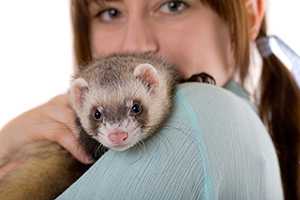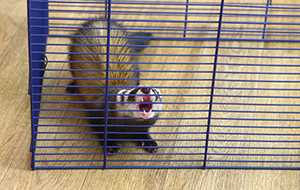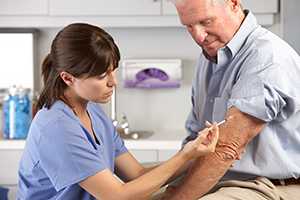Ferrets
Ferrets have become common household pets in the United States. Their small size and curious  and friendly nature lends them to be suitable pets, companions, and even service animals in some cases. Pet owners should be aware that although ferrets can make good pets, they can also carry germs (such as bacteria, parasites, or viruses) that can make people sick. Germs that ferrets can carry have been known to cause a variety of illnesses, ranging from minor skin infections to serious disease.
and friendly nature lends them to be suitable pets, companions, and even service animals in some cases. Pet owners should be aware that although ferrets can make good pets, they can also carry germs (such as bacteria, parasites, or viruses) that can make people sick. Germs that ferrets can carry have been known to cause a variety of illnesses, ranging from minor skin infections to serious disease.
It is rare for germs from ferrets to spread to people, but pet owners should be aware of the risks and take precautions. Protect yourself and your family from getting sick by
- Seeking routine veterinary care for your pet.
- Always washing your handsand the hands of children with running water and soap after contact with ferrets, their stool, and their food.
By providing your pet with routine veterinary care and following some simple health tips, you are less likely to get sick from touching, petting, or owning ferrets.
Diseases associated with ferrets than can cause human illness include:
Campylobacteriosis (Campylobacter spp.)
Campylobacter spreads through contaminated food (meat and eggs), water, or contact with stool of infected animals. Ferrets that are young or have weak immune systems may be more prone to this bacterial infection. Affected animals can have no signs of illness at all or may have gastrointestinal signs, including vomiting, diarrhea, and constipation.
Most people who become sick with campylobacteriosis will have diarrhea, cramping, abdominal pain, and fever within 2 to 5 days after exposure to the organism. In persons with weak immune systems, Campylobacter can cause serious life-threatening infections.
Cheyletiellosis (Rabbit fur mites; Cheyletiella spp.)
Rabbit fur mites (Cheyletiella spp.) are tiny parasites that can be found on some healthy ferrets. These mites generally do not cause disease in people or animals. Adult mites may be easily seen on an affected ferret. They are often white and may look like “walking dandruff” if observed moving. Affected ferrets may have hair loss, dandruff, or itching because of skin irritation from the mites.
People may get Cheyletiella mites when they pet or hold a ferret infested with mites. Cheyletiella can temporarily infest humans, causing skin irritation and itching. The best way to prevent infestation in ferrets is to use an insecticide recommended by your veterinarian.
Giardiasis (Giardia spp.)
Giardia is a parasite that causes diarrhea in animals and people. Giardia is transmitted to animals and people through food or water contaminated with stool.
Some ferrets with Giardia may not seem sick, while other ferrets may stop eating, appear weak, and have diarrhea. If untreated, ferrets with Giardia can have difficulty absorbing nutrients from their food and become dehydrated.
Symptoms for animals and people include diarrhea, greasy stools, and dehydration. People can also have abdominal cramps, nausea, and vomiting. Symptoms can last 1 to 2 weeks.
Influenza
Influenza or “flu” is a common viral disease among humans that can be transmitted to ferrets and then spread from ferrets back to humans. Ferrets are very susceptible to flu. Affected ferrets can have a variety of symptoms, including fever, thick clear or dried discharge from their nostrils, sneezing, coughing, decreased appetite, and weakness. No influenza vaccine is available for ferrets.
People can have similar symptoms as ferrets. Because influenza is contagious from ferrets to humans and from humans to ferrets, people should not handle ferrets if either shows signs of flu.
Pasteurellosis (Snuffles; Pasteurella multocida)
Pasteurellosis is a bacterial disease spread by bites and scratches from infected animals. Pasteurella is a normal type of bacteria that lives in the mouths of some species of healthy animals. Pasteurella usually does not make ferrets sick; however, ferrets can develop skin infections in areas where they were scratched or bitten by another animal.
Pasteurella can cause painful wound and skin infections in people who are bitten or scratched by an infected ferret. In more severe cases, it can cause widespread infection throughout the body and might even affect the nervous system.
Rabies
Rabies, a fatal neurologic disease in animals and people, is caused by a virus. Animals and people are most commonly infected through bites from rabid animals. Ferrets with rabies have a rapid change in their behavior followed by paralysis. Rabies is prevented by vaccination.
The first symptoms in people can start days to months after exposure and include weakness, fever, and headache. Within a few days after those first symptoms appear, symptoms will get worse and include confusion, anxiety, unusual behavior, and delirium. If you have been bitten by an unvaccinated ferret that has been acting strangely or different than normal, contact a health care provider right away. Once symptoms appear, it is almost always too late for a person to be treated.
Rat Bite Fever
Rat bite fever is a rare bacterial disease transmitted by bites or scratches from infected rodents and ferrets. It can also be spread by exposure to contaminated water, food, or urine. Ferrets can carry the infectious bacteria but have no signs of illness.
In people, clinical signs range from flu-like symptoms and a rash to more severe infections of the joints, liver, heart, lungs, brain, and blood if left untreated.
Ringworm (Dermatophytosis)
Ringworm is a condition caused by a fungus that can infect skin, hair, and nails of both people and animals. Ringworm is passed from animals to people through direct contact with an infected animal’s skin or hair. Kits (baby ferrets) and young ferrets are most commonly affected and can have circular areas of hair loss anywhere on their bodies.
Ringworm infections in people can appear on almost any area of the body. These infections are usually itchy. Redness, scaling, cracking of the skin, or a ring-shaped rash may occur. If the infection is on the scalp or on the skin under a beard, hair may fall out. Infected nails become discolored or thick and may possibly crumble.
Salmonellosis (Salmonella spp.)
Salmonella spreads to people and animals through contaminated food (eggs and meat) or contact with the stool of certain animals, including ferrets. Salmonella infections are not common in ferrets, but if they are infected, ferrets can have a variety of symptoms, ranging from diarrhea and dehydration to weight loss and refusal to eat.
People infected with Salmonella can have diarrhea, vomiting, fever, or abdominal cramps. Infants, older adults, and people with weakened immune systems are more likely than others to develop severe illness.
Sarcoptic Mange (Trixacarus caviae)
Sarcoptic mange is a parasitic skin disease that is caused by a tiny mite. Sarcoptic mange is transmitted between animals through close contact. In pets, the mite causes severe itching and self-inflicted wounds from scratching.
People cannot become infested with the canine and ferret version of sarcoptic mange, but they can have a minor rash from the mites if they come in contact with an infested animal.
In this section
Healthy habits
CDC recommends hand washing whenever you work or play with ferrets.
-
Wash your hands with soap and running water after contact with ferrets,
 their saliva, or their stool. Be sure to help children wash their hands. Thoroughly washing hands will reduce your risk of getting a disease from ferrets.
their saliva, or their stool. Be sure to help children wash their hands. Thoroughly washing hands will reduce your risk of getting a disease from ferrets. - Avoid bites and scratches from ferrets. Ferret bites might become seriously infected or might be a source of rabies, especially if the ferret is unvaccinated and has had contact with a rabid animal. Be cautious with unfamiliar animals. Be careful whenever you approach ferrets you don’t know, even if they seem friendly.
- Visit your veterinarian for routine checkups and care of your pet ferrets to keep them healthy and to prevent them from getting infectious diseases.
Tips for preventing ferret-associated diseases
Before choosing a ferret
- Check your state, local, and property laws before choosing or buying a ferret. Just because you can buy a pet doesn’t mean that it is legal to own it in your city, state, or property.

- Learn how to properly care for your ferret. Find out what your pet needs in regards to food, daily activities, cage, and environment. Proper care and nutrition for your pet will keep it happy and healthy.
- Ferrets might not be suitable for your family. This guideline is particularly true if your household has young children, pregnant women, or people with weakened immune systems. People with weakened immune systems include the elderly and people with illnesses such as diabetes, HIV/AIDS, or cancer.
Choosing a ferret
- Pick a ferret that is bright, alert, and active. Ferrets should have a glossy
 coat free of stool. If any animals in a cage look sick, do not choose a pet from that cage. Signs of illness in a ferret include appearing sluggish or depressed, having diarrhea, abnormal breathing, and fluid running from its eyes or nose.
coat free of stool. If any animals in a cage look sick, do not choose a pet from that cage. Signs of illness in a ferret include appearing sluggish or depressed, having diarrhea, abnormal breathing, and fluid running from its eyes or nose. - Consider having a veterinarian examine your new ferret before you finalize the purchase or adoption to ensure that it is healthy. After selecting your new pet, make sure to take your new ferret to the veterinarian within a few days to a week after adoption for a health visit.
Housing your ferret
- Keep your pet out of the kitchen and other areas where food is prepared. Do not eat while handling your pet.
- Wash your hands thoroughly with soap and water after handling ferrets or their cages and bedding. Hand washing will reduce the risk of disease spreading from your pet to you and your family.
- Avoid bites and scratches from ferrets by learning how to approach and hold your pet safely. Visit a veterinarian for your ferret’s routine checkup.
- Always use disposable gloves or plastic bags when cleaning up stool from your pet. Be careful to peel off the gloves inside out so you do not touch the outside. Wash your hands thoroughly afterwards.
Monitor your pet’s health
- If your pet becomes sick or dies soon after purchase:
- Contact your veterinarian.
- Inform the pet store or breeder about the pet’s illness or death. Consider waiting before purchasing another pet from the same source.
- Clean and disinfect the cage before allowing another pet to use it.
- Examine your ferret daily, looking for any changes in activity level, appetite, or overall health. Specifically, look for sluggish or depressed behavior, dull hair coat, loose stool, discharge from the eyes or nose, or abnormal breathing, as these may be signs of underlying disease. If your ferret appears sick, contact your veterinarian immediately.
- Have your pet examined by a veterinarian yearly, or sooner if it appears sick. Veterinarians who focus or specialize in small mammal pets, including ferrets, can provide extra guidance on caring for your pet.
- Be aware that ferrets can shed Salmonella and other germs. Avoid skin contact with animal stools and urine because it may be infectious. Wash your hands thoroughly with soap and water after feeding or cleaning up behind ferrets. Be sure to help children wash their hands.
- If you become sick shortly after purchasing or adopting a ferret, tell your doctor about your new pet.
What to do if bitten or scratched by a ferret?
Many types of germs can be spread from animal bites and scratches,  even if the wound does not look very bad. Unvaccinated ferrets are at risk for rabies and can spread rabies to you if they become infected.
even if the wound does not look very bad. Unvaccinated ferrets are at risk for rabies and can spread rabies to you if they become infected.
- Wash the wound with warm soapy water immediately.
- Seek medical attention if:
- If the pet appears sick.
- If the wound is serious.
- If the wound becomes red, painful, warm, or swollen.
- If it has been more than 5 years since your last tetanus shot.
- If you don’t know if the ferret has been vaccinated against rabies.
- If you were bitten by a ferret you don’t know, report the bite to animal control or your local health department. If possible, contact the owner and ensure the animal has a current rabies vaccination. You will need the rabies license number, name of the veterinarian who administered the vaccine, and the owner’s name, address, and phone number.
- Ensure that the pet is seen by a veterinarian if it becomes sick or dies shortly after you were bitten.
Ferrets and influenza 
Ferrets are also affected by influenza A and B (flu). Not only can ferrets give the flu to humans, but humans can also spread the flu to ferrets. If you have a pet ferret at home, you should:
- Have members of your household vaccinated annually against seasonal flu strains.
- There is no current vaccine for flu in ferrets, so the best way to protect your pet is to protect and keep yourself healthy.
- Avoid contact with your pet ferret if you or any members of your household have symptoms of the cold or flu-like illness.
- Prevent family members with flu or cold symptoms from interacting with pet ferrets while they are sick. Ask a friend, neighbor, boarding facility, or veterinarian to care for your pet ferret while those in your household recover from the illness.
- If contact with your pet is unavoidable, use face masks to prevent spreading the flu to your ferret or to protect yourself from your ferret. Also, wash your hands before and after interacting with your ferret.
- If you have multiple pet ferrets, isolate sick ferrets from the others promptly. Contact your veterinarian immediately to evaluate the health of your ferrets and discuss how to prevent the spread of flu to your other pet ferrets and yourself.
Publications and materials
Brochures
Selecting a ferret.
American Veterinary Medical Association
Podcasts
Terrestrial Rabies and Human Post-Exposure Prophylaxis.
CDC
Influenza 2010-201:1 ACIP Vaccination Recommendations.
CDC
Additional information
Banks R, et al. Exotic Small Mammal Care and Husbandry. Ames, Iowa: Wiley-Blackwell, 2010.
Influenza Technical Fact Sheet.
Center for Food Security and Public Health.
Judah V, et al. Exotic Animal Care and Management. Clifton Park, NY: Delmar Cengage Learning, 2008.
Prevention and Control of Influenza. Recommendations of the Advisory Committee on Immunization Practices, 2006. Morbidity and Mortality Weekly Report. 2006 Jul 28; 55(RR-10):1-42.
Rat Bite Fever Technical Fact Sheet (March 30, 2006). [PDF – 8 pages]
The Center for Food Security and Public Health.
Administration of Rabies Vaccination State Laws
Includes PDF table of laws by state. American Veterinary Medical Association
- Page last reviewed: October 1, 2015
- Page last updated: October 1, 2015
- Content source:


 ShareCompartir
ShareCompartir